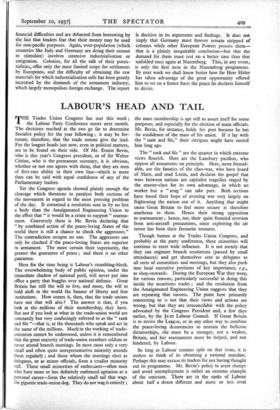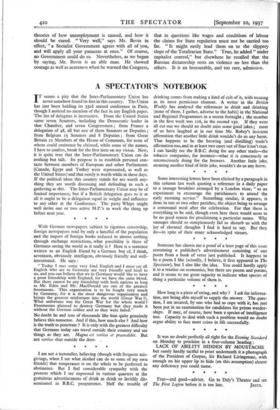LABOUR'S HEAD AND TAIL
THE Trades Union Congress has met this week ; the Labour Party Conference meets next month. The decisions reached at the two go far to determine Socialist policy for the year following ; it may be for- tunate, therefore, that the trade unions give the lead. For the longest heads just now, even in political matters, are to be found on their side. Of Mr. Ernest Bevin, who is this year's Congress president, or of Sir Walter Citrine, who is the permanent secretary, it is obvious, whether or not one agrees with them, that they are men of first-rate ability in their own line—which is more than can be said with equal confidence of any of the Parliamentary leaders.
Yet the Congress agenda showed plainly enough the cleavage which threatens to paralyse both sections of the movement in regard to the most pressing problem of the day. It contained a resolution sent in by no less a body than the Amalgamated Engineering Union to the effect that "it would be a crime to support" rearma- ment. Conversely there is Mr. Bevin declaring that " by combined action of the peace-loving States of the world there is still a chance to check the aggressors." The contradiction escapes no one. The aggressors can only be checked if the peace-loving States are superior in armament. The more certain their superiority, the greater the guarantee of peace ; and there is no other guarantee.
Here for the time being is Labour's stumbling-block. The overwhelming body of public opinion, under the immediate shadow of national peril, will never put into office a party that boggles over national defence. Great Britain has still the will to live, and more, the will to hold aloft in the world the banner of liberty and free institutions. How comes it, then, that the trade unions have not that will also ? The answer is that, if you look at the millions of their membership, they have. But not if you look at what in the trade-union world are constantly but very confusingly referred to as the "rank and file "—that is, at the thousands who speak and act in the name of the millions. Much in the working of trade- unionism cannot be understood, unless it is remembered that the great majority of trade-union members seldom or never attend branch meetings. In most cases only a very small and often quite unrepresentative minority attends them regularly ; and those whom the meetings elect as delegates, or as minor officials, form a smaller minority still. These small minorities of enthusiasts—often men who have more or less definitely embraced agitation as a personal career—form the relatively small tail that wags the gigantic trade-union dog. They do not wag it entirely ; the mass membership is apt still to assert itself for some purposes, and especially for the election of main officials. Mr. Bevin, for instance, holds his post because he has the confidence of the mass of his union. If it lay with the "rank and file," their intrigues might have ousted him long ago.
The "rank and file" are the quarter in which extreme views flourish. Here are the Lansbury pacifists, who oppose all armaments on principle. Here, more formid- able, are the fanatics of the class-war, who have heard of Marx, and read Lenin, and declaim the gospel that wars between nations are capitalist tragedies staged by the master-class for its own advantage, in which no worker but a " mug " can take part. Both sections have based their hope of averting war very largely on frightening the nation out of it. Anything that might cause Great Britain to feel more secure is therefore anathema to them. Hence their strong opposition to rearmament ; hence, too, their quite frenzied aversion from anti-aircraft precautions, since exploiting the air terror has been their favourite resource.
Though beaten at the Trades Union Congress, and probably at the party conference, these minorities will continue to exert wide influence. It is not merely that they can engineer branch resolutions (passed by small attendances) and get themselves sent as delegates to all sorts of committees and meetings, but they also push into local executive positions of key importance, e.g., as shop-stewards. During the European War they were, for various reasons, particularly successful in doing this inside the munitions trades ; and the resolution from the Amalgamated Engineering Union suggests that they are repeating that success. The point here primarily concerning us is not that their views and actions are wrong, but that they are irreconcilable with the policy advocated by the Congress President and, a few days earlier, by the Jo nt Labour Council. If Great Britain is to revive the League, or in any other way to combine the peace-loving democracies to restrain the bellicose dictatorships, she must be a stronger, not a weaker, Britain, and her rearmament must be helped, and not hindered, by Labour.
So long as Labour remains split on that issue, it is useless to think of its obtaining a national mandate. Perhaps this may excuse its leaders for not having thought out its programme. Mr. Bevin's policy to avert slumps and avoid unemployment is rather an extreme example of the omission. There are in the ranks of Labour about half a dozen different and more or less rival theories of how unemployment is caused, and how it should be cured. "Very well," says Mr. Bevin in effect, "a Socialist Government agrees with all of you, and will apply all your panaceas at once." Of course, no Government could do so. Nevertheless, as we began by saying, Mr. Bevin is an able man. He showed courage as well as acuteness when he warned the Congress, that in questions like wages and conditions of labour the claims for State regulation must not be carried too far. "It might easily lead them on to the slippery slope of the Totalitarian State." True, he added " under capitalist control," but elsewhere he recalled that the Russian dictatorship rests on violence no less than the others. It is an honourable, and too rare, admission.











































 Previous page
Previous page